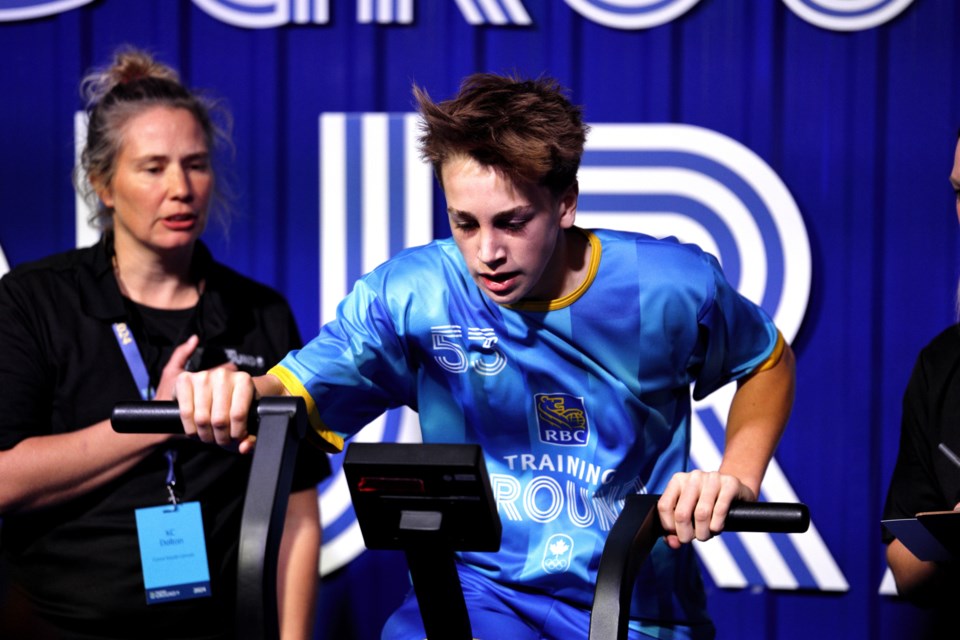MOOSE JAW — Fifteen-year-old Luka Markon, a competitive mountain biker from Moose Jaw now living in Comox Valley, B.C., has earned funding and a fast track to the Olympics in a sport he never expected to compete in when identified by Luge Canada at an RBC Training Ground event back in March.
Markon was one of over 2,500 athletes aged 14 to 25 to participate in this year’s program. From that intake, 100 athletes were invited with only 30 selected for funding at the final event in Halifax, N.S., on Nov. 2.
“We met Luka through the RBC Training Ground event in Victoria back in March, saw some potential in his testing and his sport background, and invited him to try the sport,” announced Sam Edney, Luge Canada’s high performance director.
“He’s shown a strong interest in luge, and (has) the athletic abilities that could see him really excel. We’re excited about his future.”
The RBC Training Ground program, now in its ninth year, is a national talent identification and athlete funding program designed to discover the next generation of Canadian Olympians. The program is run in partnership with the Canadian Olympic Committee and regional Canadian sport institutes.
The program evaluates athletes from diverse sports through tests measuring speed, strength, power, and endurance, all under the watchful eyes of Olympic talent scouts representing 13 disciplines.
Selection also considers an athlete’s physical measurements like height and wingspan, sport-specific testing conducted after the qualifier stage, and their competitive sports history.
“Some of the athletes who participate in RBC Training Ground are looking to reenergize or boost an Olympic dream in a sport they are already participating in,” explained Evan MacInnis, the technical director for the RBC Training Ground program.
“Others participate with the hope of being discovered and directed toward an Olympic sport they may have never considered, but they all rely on raw athleticism to impress our sport partners and compete for funding.”
Since its inception in 2016, the program has tested around 16,000 athletes through free local events and flexible virtual options, ultimately identifying over 3,000 athletes with Olympic potential.
One of the latest athletes to be identified by the program was Markon, who lived in Moose Jaw until around the age of seven when his father was reassigned from 15 Wing Moose Jaw during his military career.
“I’m pretty proud (to represent Moose Jaw) and I’m excited to train, improve, and hopefully make it to the Olympics,” Markon said.
Markon admitted that he was “a little bit surprised” to learn that he was selected, but also knew he trained as best he could and now enjoys a new sport that he described as “pretty fun.”
“It’s a little different (from mountain biking), but there are a few similarities too,” he explained. “I’ve been learning pretty fast and… (find that) the speed and how every little movement does a lot on the track and (how) you need to be very precise (are similar to what I’m used to).
“I’m really grateful that my dad found out about the RBC (program) and signed me up. It was a really good opportunity — like a once-in-a-lifetime opportunity — and I’m glad I took (it) and did my best,” he added.
The RBC Training Ground program has already made a significance impact, with 21 alumni competing in three Olympic games and earning a combined 14 medals, including seven at the Paris 2024 Summer Games.
Notable medallists include Krissy Scurfield and Avalon Wasteneys, who won silver for Team Canada, along with Kelsey Mitchell who competed in track cycling and Marion Thénault who competed in freestyle skiing. Both Mitchell and Thénault excelled in sports they never tried prior to participating in the RBC Training Ground — a growing list that now includes Markon.
To view a complete list of the 30 athletes selected for funding this year, visit RBCTrainingGround.ca.




